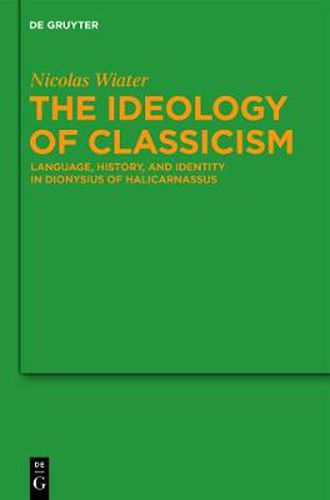Readings Newsletter
Become a Readings Member to make your shopping experience even easier.
Sign in or sign up for free!
You’re not far away from qualifying for FREE standard shipping within Australia
You’ve qualified for FREE standard shipping within Australia
The cart is loading…






So far, the critical writings of Dionysius of Halicarnassus have mainly attracted interest from historians of ancient linguistics. The Ideology of Classicism proposes a novel approach to Dionysius'oeuvre as a whole by providing the first systematic studyof Greek classicism from theperspective of cultural identity. Drawing on cultural anthropology and Social Identity Theory, Wiater explores the world-view bound up with classicist criticism. Only from within this ideological framework can we understand why Greek and Roman intellectuals in Augustan Rome strove to speak and write like Demosthenes, Lysias, and Isocrates.
Topics addressed by this study include Dionysius’ view of the classical past; mimesis and the aesthetics of reading; language and identity; Dionysius’ view of the Romans, their power and the role of Greek culture within it; Greek classicism and the contemporary controversy about Roman identity among Roman intellectuals; the self-image as Greek intellectuals in the Roman empire of Dionysius andhis addressees; the dialogic design of Dionysius’ essays and how it implements a sense of elitism and distinction; Dionysius’ attitudes towards communities competing with him for leadership in rhetorical education and criticism, such as the Peripatetics and Stoics.
$9.00 standard shipping within Australia
FREE standard shipping within Australia for orders over $100.00
Express & International shipping calculated at checkout
So far, the critical writings of Dionysius of Halicarnassus have mainly attracted interest from historians of ancient linguistics. The Ideology of Classicism proposes a novel approach to Dionysius'oeuvre as a whole by providing the first systematic studyof Greek classicism from theperspective of cultural identity. Drawing on cultural anthropology and Social Identity Theory, Wiater explores the world-view bound up with classicist criticism. Only from within this ideological framework can we understand why Greek and Roman intellectuals in Augustan Rome strove to speak and write like Demosthenes, Lysias, and Isocrates.
Topics addressed by this study include Dionysius’ view of the classical past; mimesis and the aesthetics of reading; language and identity; Dionysius’ view of the Romans, their power and the role of Greek culture within it; Greek classicism and the contemporary controversy about Roman identity among Roman intellectuals; the self-image as Greek intellectuals in the Roman empire of Dionysius andhis addressees; the dialogic design of Dionysius’ essays and how it implements a sense of elitism and distinction; Dionysius’ attitudes towards communities competing with him for leadership in rhetorical education and criticism, such as the Peripatetics and Stoics.